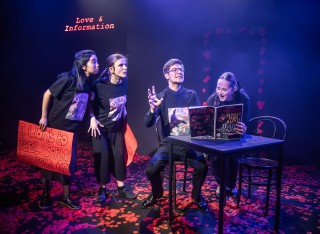
Jo Franklin
About
Biography
I am a stage manager, educator and academic and I lead on technical theatre training for Guildford School of Acting, overseeing our BA and MA programmes in this area. I started out by undertaking BA (Hons) in Drama at Aberystwyth, where I discovered my love for working backstage. I then trained in stage management as a post-graduate at the Royal Welsh College of Music and Drama and worked as a stage manager in a wide variety of contexts including repertory theatres (Northern Stage, Nottingham Playhouse, Watford Palace, Leicester Haymarket), on tour (commercial tours and English Touring Theatre), in the West End and the Royal Shakespeare Company in Stratford-upon-Avon and the Barbican.
I joined GSA initially as a freelance stage and production manager before moving into teaching both undergraduates and postgraduates, including setting up the MA in Stage & Production Management, the only dedicated course of this type in England. I completed both the Graduate Certificate in Learning and Teaching and then the MA in Higher Education at Surrey, which has led to my keen interest in pedagogical research, particularly in the performing arts and their facilitation. I am Head of Technical Theatre Arts and programme leader for BA Theatre Production
I like to undertake professional stage management where possible, most recently as Stage Manager for large scale community opera projects. I have been External Examiner for institutions in the UK (LAMDA and East 15) and internationally (LASALLE College of the Arts, Singapore) and am currently External Examiner for BA Production Technology & Management at the Royal Conservatoire of Scotland.
Areas of specialism
University roles and responsibilities
- Head of Technical Theatre Arts
- Programme Leader - BA Theatre Production
My qualifications
Previous roles
Affiliations and memberships
ResearchResearch interests
- Stage management and creative facilitation of theatre and performance.
- Pedagogy, academic identity & values in stage management & technical theatre training.
- Inclusive pedagogy
Research interests
- Stage management and creative facilitation of theatre and performance.
- Pedagogy, academic identity & values in stage management & technical theatre training.
- Inclusive pedagogy
Teaching
Module leader:
PRO1033 Stage Management
PRO2033 Specialist Pathway Development 1
PRO3021 Specialist Pathway Development 2
PROM003 Production & Project Management
PROM011 Introduction to Stage & Production Management
Publications
Background: The concept of pedagogic frailty has been proposed as a unifying concept that may help to integrate institutional efforts to enhance teaching improvement within universities by helping to maintain a simultaneous focus on four key areas that are thought to impede development. Purpose: The variation in internal structure of the four dimensions of pedagogic frailty and the links that have been proposed to connect them are explored here through the analysis of interviews with academics working in a variety of disciplinary areas. Methods: The application of concept map-mediated interviews allows us to view the variable connections within and between these dimensions and the personal ways they are conceptualised by academics working across the heterogeneous university context. Results: The data show that academics conceptualise the discourse of teaching in various ways that have implications for the links that may be developed to integrate the elements within the model. Conclusions: Whilst the form and content of the maps representing dimensions of the pedagogic frailty model exhibit considerable variation, it is suggested that factors such as academic resilience and the explicit use of integrative concepts within disciplines may help to overcome some of the vulnerabilities that accompany pedagogic frailty. The data also raises questions about the links between factors that tend to be under individual control and those that tend towards institutional control.
What are the benefits to the autoethnographic subject of analysing pedagogic frailty? How might he or she continue to make use of the concept maps once they have been formulated? What can different subjects learn from examining one another’s maps? Might such an endeavour enable colleagues to gain an enhanced mutual understanding of their roles, values, and aspirations? More widely, how useful is framed autoethnography as a method for exploring pedagogic frailty? What are its advantages and its limitations? And what are the experiences of the autoethnographers themselves within such a process?
Following my journey from stage manager to academic I wanted to discover whether my experiences were unique. Although there has been investigation in other fields into transition experiences, there was no existing research in this area. In this article I investigate the values and identity of stage managers in academia and how these are affected by moving into academia, specifically within the context of the drama conservatoire. Using a qualitative phenomenological approach and examining data from online surveys and semi-structured interviews through content analysis, I sought and considered the views of those with similar career trajectories. Themes identified included uncertain identities, shared values, work/life balance, and tensions between theatre and academic structures. This study moves the stage manager working in the wings of drama schools to centre stage, examines their motivations and identities and encourages academic stage managers to claim their position confidently in this emerging field of study.
Theatre training establishments in the UK have long prided themselves on educating the ‘elite’ talents in the fields of performance, design and production. This study aims to explore the notion of ‘teaching excellence’ within technical theatre training, through interviews with both students and teachers at Guildford School of Acting. Participants noted that excellence was an important aim of teaching and fitted well with the industry facing and professional focus of the drama school, and that excellence should be measured and improved. However, our research found that excellence is a hard term to define meaningfully and difficult to measure fairly. We believe that further research is needed to move closer to defining, planning, implementing and measuring teaching excellence in this sector.
This article is an autoethnographic account of my journey from theatre stage manager to academic stage manager. Performing arts education and training in Higher Education is a diverse field, ranging from small private institutions to large research lead universities. Professional practitioners (performers, stage managers, technicians, designers, directors, etc.) are sought by all types of institution to share their expertise in teaching, yet find themselves working in a world that is familiar (the theatre) but at the same time alien (the academy). Those who make a successful transition find a way to reconcile these contrasting worlds. I hope, through this paper, to contribute to discussion of the challenges this transition entails through critical reflection and contextualisation of my personal journey.
